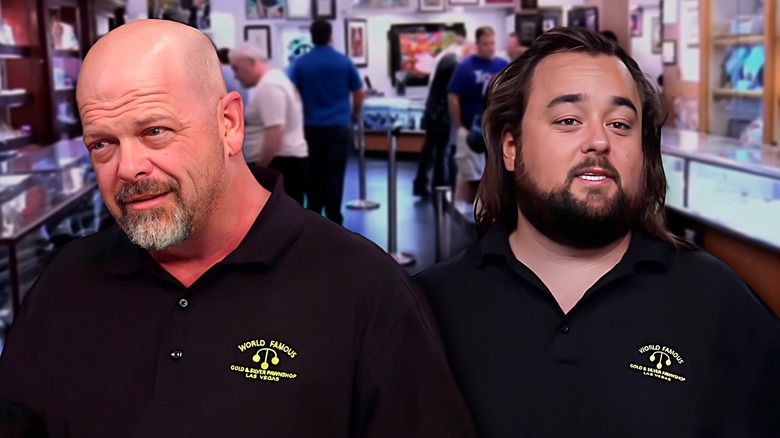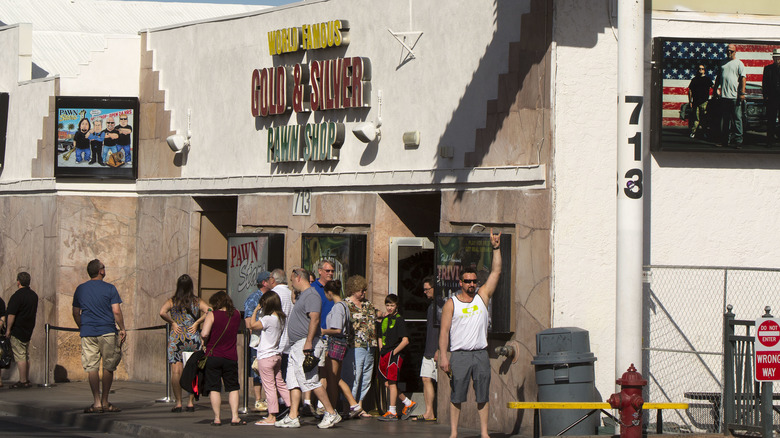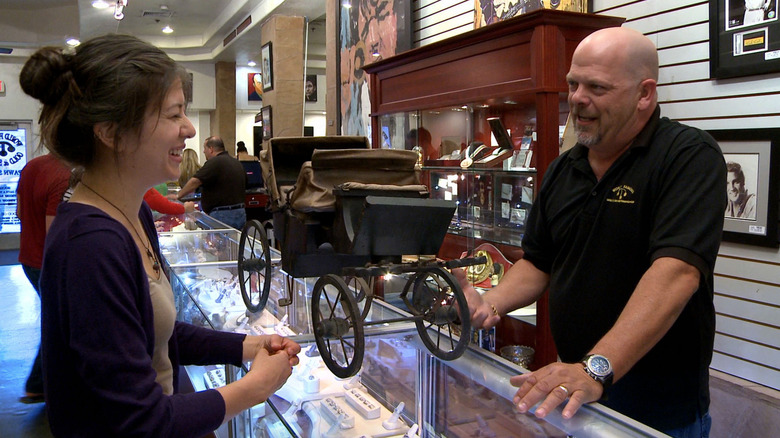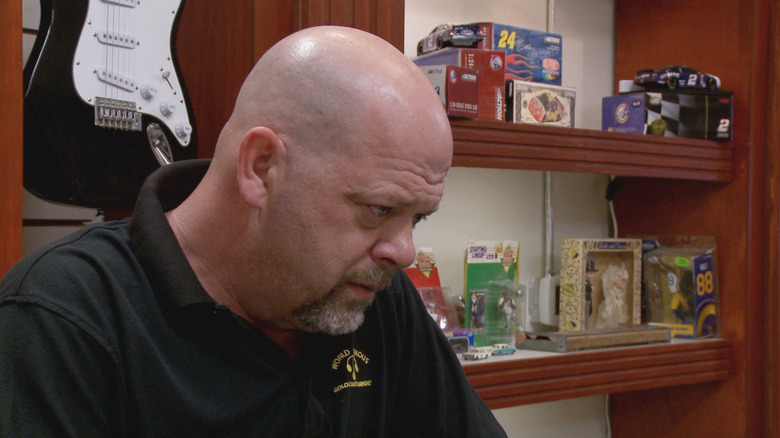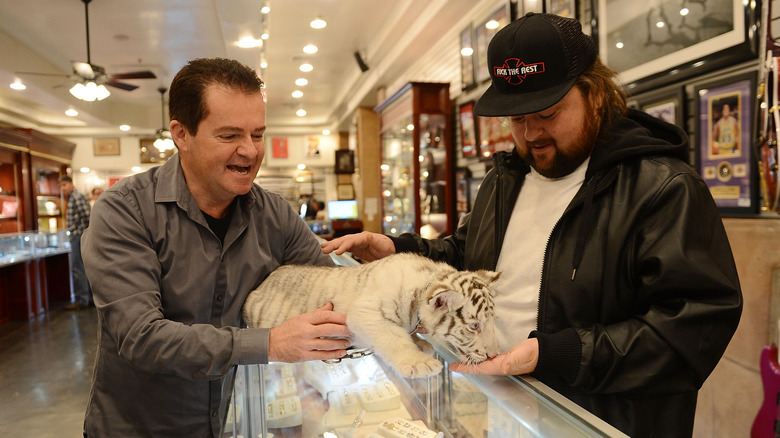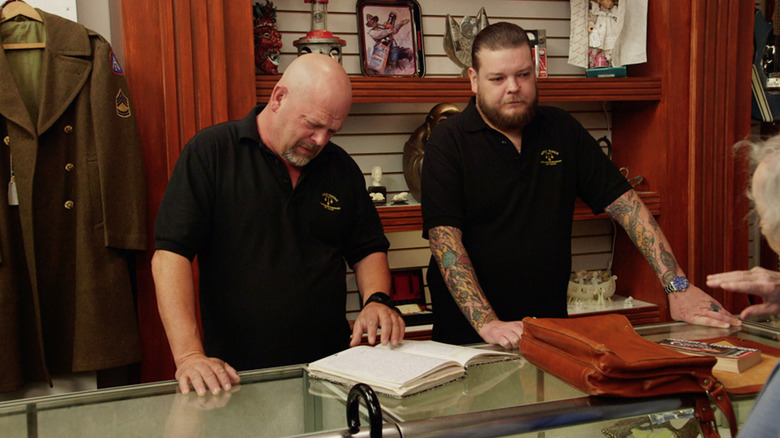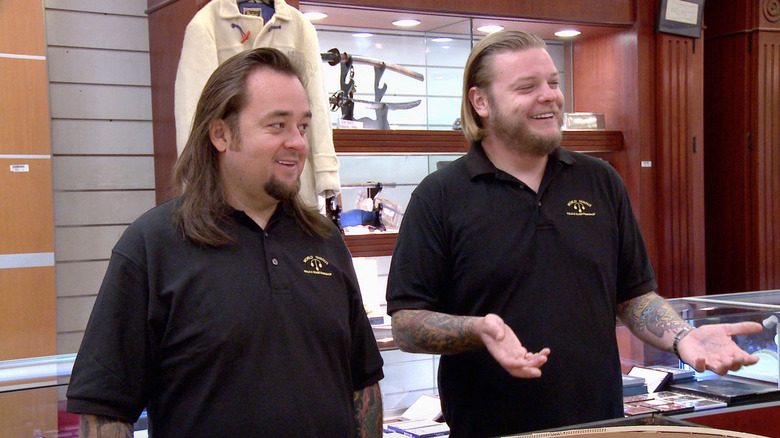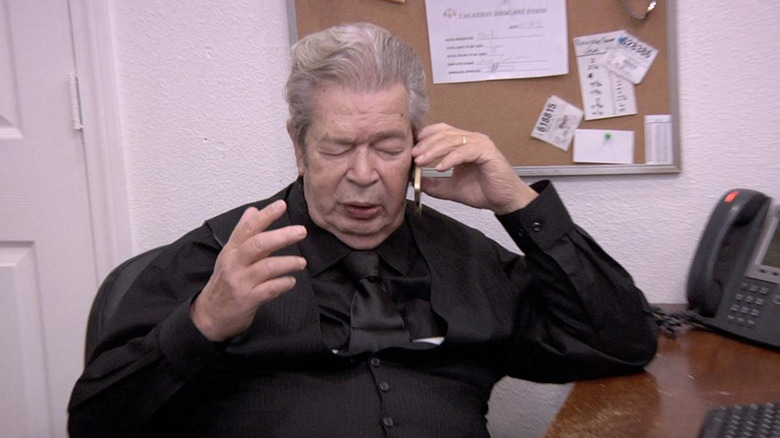Proof That Pawn Stars Is Totally Fake
At the core of the enduring success of "Pawn Stars" is the show's perfectly formulaic premise that combines the best elements of reality TV. Centered on the daily operations of the family-owned and operated World Famous Gold & Silver Pawn Shop in Las Vegas, the series features unique artifacts, historical insights, negotiation drama, and the entertaining dynamics of the Harrison family. It's a series that informs and entertains, and while the former is rooted in truth, the latter stretches it and has kept audiences tuning in week after week for more than a decade.
The inherent nature of reality TV reminds us that not everything presented is an unfiltered reflection of real life. While the show provides genuine historical information and snippets of authentic interactions, the highly orchestrated editing and production process undoubtedly shape the narrative for entertainment purposes. In the production of "Pawn Stars," a significant portion of the episodes involves pre-planned scenarios or guidance from producers to intensify drama, infuse humor, or generate conflict. While the contrived nature of reality TV is no secret to many viewers, it's nevertheless interesting to unravel the degree to which certain elements are more manufactured than others. Fortunately, we've dug up all the proof we could find exposing the fake aspects of "Pawn Stars."
The shop operates as a tourist destination
What you see is not exactly what you get when it comes to how the World Famous Gold & Silver Pawn Shop is portrayed on "Pawn Stars." While the show depicts the shop as a typical pawn shop through carefully crafted camera angles and scenes, the actual operation differs significantly. Since its successful debut in 2009, the shop has transformed into a popular tourist attraction in the Las Vegas area. To cater to and capitalize on the influx of tourists, the shop has undergone multiple expansions, both in terms of staff and physical size. This expansion includes the addition of a gift shop for show merchandise, a facet deliberately excluded from the show's depiction. Surprisingly, the merchandise sold in-store has become a more prominent selling point than the actual sale of artifacts and antiques. Big sellers like cast bobbleheads and T-shirts can also be bought off the shop's official website.
Viewers who have visited the shop in person have described on Tripadvisor running into long lines comprising anticipated sightseers rather than actual pawners looking to make a sale. In fact, only 1 out of every 100 visitors is actually there for the shop's pawning services, shop manager Travis Benton told the Las Vegas Review-Journal. Once inside, many visitors reported being surprised by the shop's relatively small size compared to what they're used to seeing on screen. When it comes to filming, only approved extras and sellers are allowed inside the store during the show's production, dispelling the illusion that the background shoppers are unsuspecting randos.
Sellers and their items featured on the show go through a vetting process
Speaking of unsuspecting randos, not just anyone is allowed to walk through the pawn shop doors on the show with something to sell. Before anyone can appear on camera, sellers and their items must go through a vetting process with producers to ensure that the items brought in are TV-worthy and that the sellers are camera-ready. This process includes producers actively seeking out potential sellers who possess intriguing or unique items. This may involve reaching out to individuals who have contacted the show expressing an interest in selling. It's not just about the monetary value of the items but also about the historical, cultural, or personal stories behind them. The producers are also looking for sellers who are not only willing to part with their possessions but are also comfortable and engaging on camera. Salesman Rocco Landi shared with the Las Vegas Review-Journal about rare instances on the show when segments had to be cut entirely because sellers couldn't "pull it together" on camera.
By carefully curating the items and ensuring that the sellers are camera-ready, the production team can optimize the overall viewer experience. This planning helps prevent any dull or uninteresting moments, ensuring that each episode remains engaging and full of surprises. Essentially, Rick Harrison's famous line, "You never know what is gonna come through that door!" isn't exactly accurate, but we can let it slide for the sake of entertainment.
Scripters shape the show's narrative
The burning question on everyone's mind: Is "Pawn Stars" scripted? How else could Rick Harrison possibly know every historical detail of every item on the spot? The idea that the cast might be reciting lines verbatim could shatter the illusion of reality in reality TV. Fortunately for those who savor the show's perceived authenticity, "Pawn Stars" doesn't adhere to a strict script. Well, at least not entirely.
Rather than the cast mechanically delivering pre-written lines, the show maintains a semblance of spontaneity. The absence of scripted dialogue doesn't mean, however, that the production is devoid of guidance. On set, there are members of the crew whom executive producer Brent Montgomery refers to as "scripters," which he credits with contributing to the show's success in an interview with the outlet Odyssey. Their role involves strategically feeding facts to the cast members and shaping the show's narrative in real time by orchestrating the flow of conversations and interactions to infuse just the right amount of drama, information, and entertainment.
Of course, this form of manipulation isn't exclusive to "Pawn Stars." Rather, it's a common practice in the production of all reality TV. While the genre is grounded in capturing real-life situations and exchanges, the need for engaging content often prompts producers and writers to shape narratives to some extent. The balance between authenticity and entertainment often involves a delicate dance of behind-the-scenes planning and editing to ensure the final cut resonates with viewers.
What you see in Pawn Stars is not an authentic pawn shop experience
If you've ventured into a pawn shop before, you'll know the experience differs significantly from what is portrayed on "Pawn Stars" or even from the everyday reality at the World Famous Gold & Silver Pawn Shop. Because of the show's careful vetting process for all sellers and their items, the World Famous Gold & Silver Pawn Shop is one of the few shops where you can encounter such rare and valuable items. This glamorous aspect of pawning depicted in "Pawn Stars" isn't a true reflection of the typical pawn shop experience and serves obvious entertainment purposes.
Unlike in "Pawn Stars," where only the most unique and valuable items make their way into the shop, most pawn shops, in contrast, deal with smaller, everyday items, offering financial assistance to those facing temporary financial challenges. In the real world of pawn shops, the focus is on providing a practical service to the community. These establishments play a crucial role in helping people navigate financial difficulties by accepting a wide range of items as collateral for short-term loans. According to Investopedia, loans are the chief source of income for most American pawn shops, as they take an item as collateral, usually with a higher interest rate than you'd find in a bank.
The kinds of people who frequent pawn shops are not necessarily the avid collectors you see on "Pawn Stars," either. "No one pawns their possessions to buy books, but many do so to buy a flask of vodka and cigarettes," one pawn shop employee told Vice Poland in an interview highlighting the reality of the business in that country. The most commonly pawned items include jewelry, but also power tools, electronics, and music or sports equipment — not exactly the extraordinary artifacts viewers are used to seeing on "Pawn Stars."
The regular Pawn Stars cast doesn't work behind the counter
If you're hoping to run into your favorite cast members during a visit to the World Famous Gold & Silver Pawn Shop in Las Vegas, you may need to think again. Contrary to what's depicted in "Pawn Stars," the main shop staff, Rick, Corey, and Chumlee, aren't the ones working behind the counter when the cameras aren't rolling. The difference between reality and the show's portrayal of the trio as the front-facing figures of the establishment stems from a combination of practical and logistical considerations.
In reality, running a pawn shop requires meticulous attention to detail, handling various transactions, and dealing with a diverse clientele. The cast members, with their celebrity status and associated commitments, may find it challenging to dedicate substantial time to the daily grind of running the counter. Specifically, the shop's official website cites busy schedules and, more importantly, Nevada privacy laws as the reasons why you won't find your favorites working at the shop. These Nevada privacy laws protect the confidentiality of customers who pawn items. Not having the main cast working during hours helps protect the inadvertent exposure of customers' identities and their personal items. However, if you're lucky, the trio will make occasional appearances for photos and autographs, but if you don't want to rely on luck, the shop's website also states you're much more likely to run into the cast next door at Pawn Plaza.
Reshoots and reenactments are commonplace in reality TV
In yet another instance that "Pawn Stars" manipulates reality, one shop visitor who served as an extra on the show shared his experience online via Quora, providing a firsthand account of how meticulous TV production can be. According to the extra's testimony, written in 2014, a single scene underwent an hour of shooting, involving multiple takes and reshoots. He said that production sent everyone but 12 approved extras out of the store (and didn't mention anything about a duplicate set). The participants were given specific instructions to maintain the show's perceived authenticity: remain silent and avoid direct eye contact with the camera while "browsing" the shop.
This directive aligns with claims made in the Vital Vegas article as well as another Reddit user's experience and earlier revelations from salesman Rocco Landi, who told the Las Vegas Review-Journal that real-life individuals appearing on the show are often coached to enhance their on-screen presence. Furthermore, the extra claimed the negotiation process underwent multiple takes and even featured reenactments in the final cut, which only ended up being five minutes out of the hour shoot. Ultimately, what viewers witness on TV is not a continuous, unfiltered stream of reality but a meticulously crafted experience designed for maximum entertainment value.
Overt product placement
Nothing disrupts the authenticity of a reality show quite like overt product placements. Whether the camera catches a conspicuous close-up on a cast member's specific car brand or a prominently placed Coca-Cola during dinner, obvious advertising can leave viewers feeling deceived. Product placements are a common source of revenue for television shows, as they provide advertisers with a way to reach audiences in a less intrusive manner than traditional commercials. However, when these placements become too overt, they can compromise the genuine and unscripted nature that reality shows are supposed to convey. Such was the case with "Pawn Stars" and their not-so-subtle branding deal with Subway.
If you haven't noticed it yet, pay close attention next time you watch the show to catch all the references to Subway. Some Reddit users have been quick to point out that whenever the guys are hungry, it seems they exclusively opt for a footlong. While they may genuinely enjoy the chain sub-sandwich shop, the repeated product placements are unmistakable. Does this make "Pawn Stars" inherently fake? It depends on who you ask, but it undeniably disrupts the viewer's immersion.
